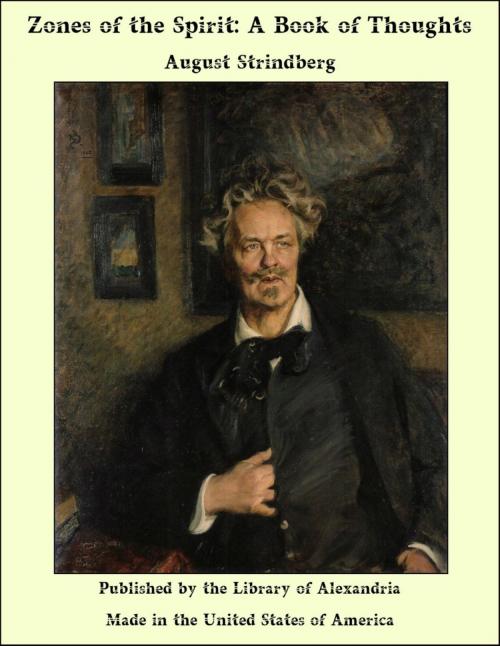Zones of the Spirit: A Book of Thoughts
Nonfiction, Religion & Spirituality, New Age, History, Fiction & Literature| Author: | August Strindberg | ISBN: | 9781465594396 |
| Publisher: | Library of Alexandria | Publication: | March 8, 2015 |
| Imprint: | Language: | English |
| Author: | August Strindberg |
| ISBN: | 9781465594396 |
| Publisher: | Library of Alexandria |
| Publication: | March 8, 2015 |
| Imprint: | |
| Language: | English |
Seldom has a man gone through such profound religious changes as this Swede, who died last May. The demonic element in him, which spurred him on restlessly, made him scale heaven and fathom hell, gave him glimpses of bliss and damnation. He bore the Cain's mark on his brow: "A fugitive and a wanderer shalt thou be." He was fundamentally religious, for everyone who searches after God is so,—a commonplace truth certainly, but one which needs to be constantly reiterated. And Strindberg's search was more painful, exact, and persevering than that of most people. He was never content with superficial formulas, but pressed to the heart of the matter, and followed each winding of the labyrinthine problem with endless patience. Too often the Divinity which he thought he had discovered turned out a delusion, to be scornfully rejected the moment afterwards. Until he found the God, whom he worshipped to the end of his days, and whose existence he resolutely maintained against deniers. As a child he had been brought up in devout belief in God, in submission to the injustice of life, and in faith in a better hereafter. He regarded God as a Father, to Whom he made known his little wants and anxieties. But a youth with hard experiences followed his childhood. The struggle for daily bread began, and his heavenly Father seemed to fail him. He appeared to regard unmoved, from some Olympian height, the desperate struggles of humanity below. Then the defiant element which slumbered in Strindberg wrathfully awoke, and he gradually developed into a free-thinker. It fared with him as it often does with young and independent characters who think. Beginning with dissent from this and that ecclesiastical dogma, his criticism embraced an ever-widening range, and became keener and more unsparing. At last every barrier of respect and reverence fell, the defiant spirit of youth broke like a flood over all religious dogmas, swept them away, and did not stop short of criticising God Himself.
Seldom has a man gone through such profound religious changes as this Swede, who died last May. The demonic element in him, which spurred him on restlessly, made him scale heaven and fathom hell, gave him glimpses of bliss and damnation. He bore the Cain's mark on his brow: "A fugitive and a wanderer shalt thou be." He was fundamentally religious, for everyone who searches after God is so,—a commonplace truth certainly, but one which needs to be constantly reiterated. And Strindberg's search was more painful, exact, and persevering than that of most people. He was never content with superficial formulas, but pressed to the heart of the matter, and followed each winding of the labyrinthine problem with endless patience. Too often the Divinity which he thought he had discovered turned out a delusion, to be scornfully rejected the moment afterwards. Until he found the God, whom he worshipped to the end of his days, and whose existence he resolutely maintained against deniers. As a child he had been brought up in devout belief in God, in submission to the injustice of life, and in faith in a better hereafter. He regarded God as a Father, to Whom he made known his little wants and anxieties. But a youth with hard experiences followed his childhood. The struggle for daily bread began, and his heavenly Father seemed to fail him. He appeared to regard unmoved, from some Olympian height, the desperate struggles of humanity below. Then the defiant element which slumbered in Strindberg wrathfully awoke, and he gradually developed into a free-thinker. It fared with him as it often does with young and independent characters who think. Beginning with dissent from this and that ecclesiastical dogma, his criticism embraced an ever-widening range, and became keener and more unsparing. At last every barrier of respect and reverence fell, the defiant spirit of youth broke like a flood over all religious dogmas, swept them away, and did not stop short of criticising God Himself.















